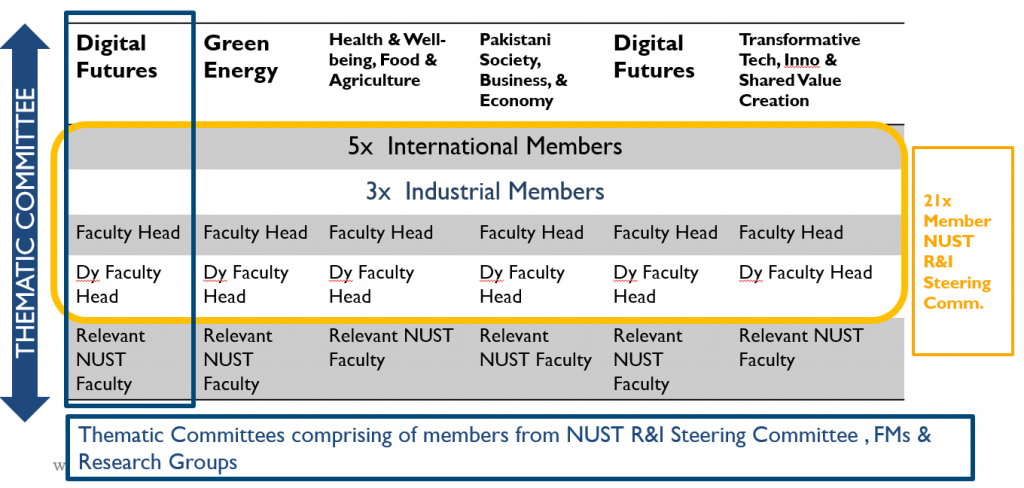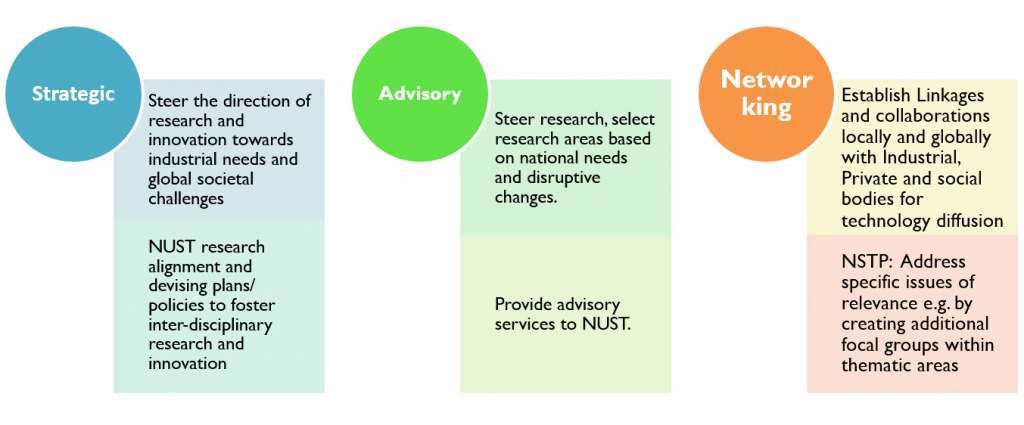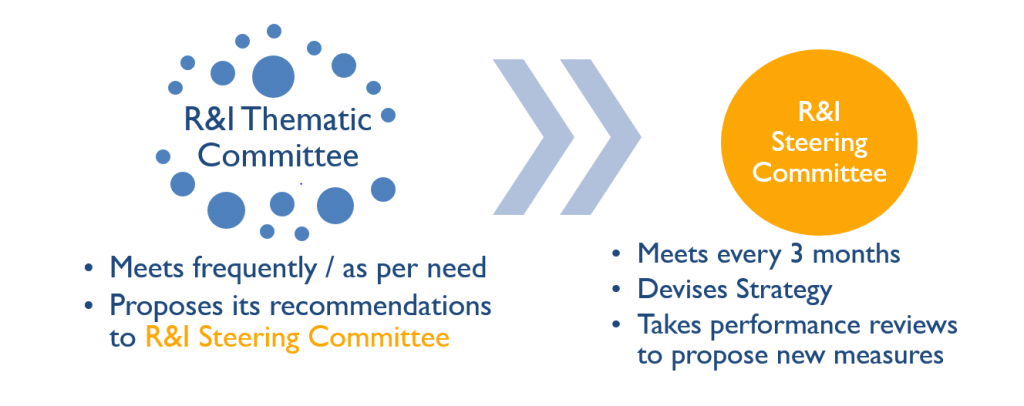RESEARCH THEMES
RESEARCH & INNOVATION FRAMEWORK
The new paradigm of higher education places universities in the pivotal role within a knowledge based economy, connecting all the aspects residing in and about the society. This model places NUST as an anchor which facilitates all the other major constituents like public, private and social bodies and channels the flow of knowledge, thus magnifying the societal impact created individually by these bodies. NUST is focusing to leverage upon this pivotal role and strengthen its research profile in order to maximize the outcomes of research to serve the society at large.
The role of research in creating societal impact to the quality of life and problem-solving cannot be underestimated. Hence, NUST has put substantial effort to improve the quality of its research by investing in its human resources, creating an environment conducive to research and learning, and fostering applied research and innovation. NUST has defined its research policy to address the multi-dimensional societal issues with the help of its diverse research capabilities. NUST has also devised a research framework to align its research internally, map the research profile with national needs and global SDGs implementation. All the decisions pertinent to research, distribution of funds, and resources would be taken in the light of these national and global needs.
In the above mentioned perspective, NUST has identified two key objectives for its research:
- Leveraging upon research to find innovative, low-cost solutions to diverse societal challenges;
- Transfer of technologies and innovations, which emerge as a result of research, in the form of cooperation with public and private enterprises.
The aim is to establish prolific partnerships with other academic institutions, public and private sectors in the light of such an effort and look for effective solutions for the problems of the society with the help of such linkages. Certain KPIs have been defined to measure the performance of research and the outcomes of research are monitored and evaluated against these KPIs, ascertaining to maximize the societal impact of NUST research.
In order to leverage fully upon NUST capabilities, it has defined six Research Themes, and 60+ Research Areas which have been delineated around NUST research profile, national and global needs.
Smart Cities
Crime Prevention
Environment and Climate Change
Geoinformatics
Infrastructure
Marine Sciences
Disaster Management
Transportation
Urban Development
Green Energy
Bio Energy
Energy Management
Energy Storage
Hydro Energy
PV Technology
Thermal Energy
Wind Energy
Health & Well-Being, Food and Agriculture
Agriculture and Food Sciences
Bio-Medical
BioTechnology
Health
Neuro sciences and Neuroinformatics
Food Security
Wind Energy
Transformative Technology, Innovation & Shared Value Creation
Aerodynamics
Avionics
Space Technology
Automotive
Chemical
Materials
Metallurgy
Mining
Petroleum
Polymers
Fluid Dynamics
Manufacturing
Mechanics
Robotics
Thermodynamics
Nanotechnology
Pakistani Society, Business & Economy
CPEC
Economics
Education
Engineering Mgnt.
Social Sciences and Humanities
Finance
Industrial Management
Logistics & Supply Chain
Marketing
Operations Mgnt.
Mathematics
Physics
Hospitality
Human Resources
Entrepreneurship
Digital Futures
AI & Machine Learning
Cryptography & Cybersecurity
Data Managment
Image, Video and Signal Processing
Modulation & Simulation
Network & Network Security
Software
Control
ICs & Electronics
Power Electronics
RF, Microwave and Telecom
The above mentioned NUST research themes provide an interdisciplinary, synergistic approach to resolve multi-disciplinary real-life societal challenges, where individual researchers contribute to their research area and ultimately to their research theme. Each theme is identified based on core issues of Pakistani economy like energy, technology and sustainable development etc. NUST has allocated resources like labs, funding and research centers according to the relevance of each theme to a real world societal challenges.
RESEARCH & INNOVATION STEERING COMMITTEE
Each research theme of NUST has a broad membership of relevant NUST faculty members, which has to be steered by a committee of experts comprising of local (NUST) and foreign academics along with representatives from industry, government, and NUST alumni. This framework ensures a two-way knowledge transfer between NUST and the community, extending cooperation with public and private enterprises. Research and innovation steering committee comprises of the following structure and memberships.

5x International Members
| Name | Designation | Affiliation |
| Dr. Sheila MacNeil | Professor | Sheffield University (UK) |
| Dr. Jun Ho Oh | Director of Humanoid Robot Research Centre | Korea Advanced Institute of Science and Technology, South Korea |
| Dr. Giuseppe Andrea Ferro | Chair of Structural Mechanics, Head of Department of Structural, Building and Geotechnical Engineering | Politecnico di Torino, Italy |
| Dr. Hans-Dietrich Haasis | Professor in Maritime Business and Logistics | University of Bremen, Germany |
| Dr. Raheel Nawaz | Director Text and Data Mining Lab | Manchester Metropolitan
University, UK |
3x Industrial Members
| Name | Designation | Affiliation |
| Umar Ahsan Khan | CEO | Dawlance Group of Companies
Arcelik (Turkey) |
| Abrar Ahmed | CEO | Shafi Reso Chemicals, Pakistan |
| Ather Imran | CEO | Sybrid Pvt. Ltd.
A Lakson Group Company |
NUST R&I Steering Committee assists academic leadership in the following ways:


Collectively, the thematic steering committee members form the NUST R&I steering committee, which will assist NUST in policy-level R&I decision making and the ability to deliver concrete results and ensure that NUST research is relevant as well as aligned to societal needs and real life challenges.